#iraqi concepts
Text


NO MORALS BY PSI.KO PHOTOGRAPHED BY REEM NAWAL AMIN
OUT NOW ON SPOTIFY
#hip hop#rap#Iraqi rapper#iraqi artist#concept art#concept photography#album cover#spotify#musicians#artists#creative director#eat the rich#Arab money#reem nawal amin#psi.ko#editorial photography
1 note
·
View note
Text
this isn’t just me plugging something that is so very catered to me and my interests but tony kushner wrote this mini play very shortly after the iraq invasion called only we who guard the mystery shall be unhappy (which of course is from the brothers karamazov) and it’s equally funny and uncomfortable and heartbreaking and furious. anyway highly recommend especially since it’s been 20 years to the day since the invasion of iraq.
#essentially it’s about laura bush reading the brothers karamazov to dead iraqi children#which is a funny concept but it just hits.#politics#tony kushner
1 note
·
View note
Note
how is isis different from hamas?
Gonna make it easy and comprehensible:
ISIS or DA'ISH is a transnational terror organization consisting of Iraqi Baathists, former Syrian rebels or moderates, recruited fighters from all over the world, former US captives in Iraq, and oppressed and disenfranchised Sunnis. Wahhabi in nature, ISIS subscribes to the literalist tradition of Islam, based on a strict adherence to Tawhid (Islamic monotheism), rejecting the concept of intercession and saint venerations, seeing them as an act of idolatry. Their religious verdicts are based on the literal interpretation of the Qur'an and Sunnah, rejecting metaphorical exegesis. They aim to establish a global caliphate, seeking to eliminate anyone who opposses it regardless of religious or ideological differences. They see their cause as a hastening of various Islamic end time prophecies in their interpretation of Islamic eschatology. Like many Salafis, they reject Taqlid, which is to conform to one of the four schools of thought in Sunni Islam. On top of that, they reject religious innovations (Bid'ah), which is the idea that anything introduced to the religion without any religious basis is heresy. Whether it be practical or theological, they deem any Muslim who engage in Bid'ah to be an apostate or heretic. They are notorious for their intolerance of non-Muslims and application of Takfirism (excommunication) on Muslims, whether Sunni or Shi'a. Christians had to pay the Jizya (poll tax) in their territories, while in other cases, they were murdered, expelled and had their churches destroyed or converted. They have no tolerance for Shi'a Muslims and will kill them on the spot (see: Speicher Massacre), and have often targeted them with IEDs or suicide bombers. Non-Muslims, like the Ezidis or Ahlul Haqq, were often subjected to execution whereas their women and children were either married away, converted or used as sex slaves. DAESH is not interested in national liberation, seeing it as a blasphemous innovation. DAESH does not consider Hamas to be Muslims due to struggle for national liberation which is supported by Iran and various Shi'i proxies.
Hamas is a political and military resistance group that consists of Palestinians. After the failures of the Oslo accord, Hamas broke away from PLO and formed their own political party. They either subscribe to the Shafi'i school of thought or some form of Ikhwani Salafism (Salafism as envisioned by the Muslim Brotherhood). They're a semi-governmental power in Gaza and are responsible for upholding the social and civil institutions, such as hospitals, schools and etc. Hamas' specific aim is localized and seeks to destroy the Zionist entity in order to form a one-state solution under an Islamic emirate or Islamic democracy. Their only enemy is Israel and any of its allies. As of the Hamas charter of 2017, they do not have an intolerance for non-Muslims or people of different religious and ideological comportments, as seen by them holding ties with both Shi'a and Socialist militias, such as Hezbollah and the PFLP/DFLP. Hamas is concerned with the national liberation of Palestine and the Palestinians. Being an entirely localized resistance group, they do not engage in global jihadism like ISIS nor do they carry out attacks internationally.
4K notes
·
View notes
Text
also the idea that military spending is just inherently wrong or to be avoided is often framed from such an imperial core perspective... like i do understand the urge to be like "the us spends a kajillion trillion dollars on its military and doesn't provide basic services to people or develop its infrastructure" or whatever but in addition to the obvious point that you're talking about the distribution of imperial riches instead of an actual end to imperialism, it's also just like, kind of inherently a useless mode of argument for anything other than scoring a few rhetorical points. like even within the us it doesn't really apply because usually there are numerous factors as to why something is shit, like for example because car companies and manufacturing interests have significantly moulded infrastructure and urban development for the last century, or because many welfare programs are funded and de-funded in explicit eugenic attempts to policy-engineer a whiter population.
and then when people try to just apply the military spending argument elsewhere it becomes particularly absurd because most countries don't spend nearly as much on their militaries in the first place, and also people will try to make this argument about military forces that exist in direct response to imperial and colonial aggression and occupation. like you can't just interpret every military force or armed struggle as though it is also the us military. what makes imperial powers' militaries bad isn't some abstract badness of violence but the fact that these forces exist to advance imperial interests. arming hamas fighters to resist israeli occupation and arming usamerican drones to bomb iraqis are not comparable acts in any way except on the most ahistorical and idealist conception of what war is and what it does. like even if hamas's resources were fungible in the way this line of thinking presumes it would still be defensible to spend them on arms, whereas even if us military money came out of a magic funnel in the sky it would still be an imperial force.
133 notes
·
View notes
Note
both your parents are iraqi immigrants and arent religious? what was that like? my parents are immigrants from a muslim majority country too and i dont know a single person with the same background who didnt grow up in at least a somewhat religious family 😅
My mom just never forced me to do anything 🤷♀️ She’s just not the type to micromanage me like that. She’s religious yes, but also educated, classy, and open-minded (these things can coexist). She never made me pray growing up, she never made me wear certain clothes growing up (if anything she’d always support me exploring my style & even buy me things the average Muslim parent might consider inappropriate), she never made me do anything religious against my will. The most I did was fast during Ramadan w my sister, but it’s more just bc we were kids who thought it was a fun concept (and we’d almost always never make it the whole day). I was too young to rly understand what religion even was, and by the time I was like a preteen I had branded myself an atheist (cringe atheist phase). Now I’d say I’m agnostic, but not religious by any stretch of the imagination.
My mom’s overprotective of me in other ways, but they’re not directly linked to religion so much as she just wants me to be safe and has high expectations for me. She probably doesn’t love that I’m 100% non-religious, but it’s not a topic she brings up at all. She just knows I’ll do what I wanna do and she can’t change my mind basically, she raised me to be that way haha. I genuinely think she’s just happy knowing I’m studying hard, taking care of myself, and have good morals—anything any parent would want of their child.
A big part of it is probably that my mom’s side is pretty liberal/lax w how they practice religion, but I also just think that she loves me to the moon and back & wouldn’t want to make me do anything that causes me to be unhappy. I think it really is that simple
Make no mistake tho, I’m veryyyy much protective of Islam. It’s my family’s faith, it’s integral to Arab culture, and it’s sickening watching the way it’s been defaced by people who don’t know nearly enough to comment on it. Just bc I’m not religious doesn’t mean I wouldn’t go in on someone who badmouths it in blind hate and ignorance.
#as for my dad I wouldn’t say he’s crazy religious either but my parents got separated very early into my life#so I never rly had to deal w his views or anything. I’ve never lived w the guy#ask
40 notes
·
View notes
Note
Sharing ideas moment: I always thought Haitham would better fit as a vulture, specially when the old world ones are depicted as good birds in cultures like the Egyptian, Hindu or Persian ones, even when now the vultures are considered ugly and very dangerous. Just the only idea that many people has fear or sees the scribe in a bad way, but then Kaveh comes in and marks the difference (in his own way), to make a curious couple between a vulture and a bird-of-paradise. It just melts my heart <3
the concept itself is cute (danger and beauty) but just a reminder that (since i see it often) al haitham is not connected to vultures in any way. hes iraqi arab and falcons are a big part of arab culture; everything about him is inspired/connected to falcons from his name to his constellation (the og cn name "sky falcon" and not whatever english translation has going on) so yea. no connections to vultures at all
just mentioning it again bc there was some drama about ppl claiming haitham is gay coded bc of (non existent) vulture/greek symbols and completely ignored what actual arabs had to say
(while btw hes implied through the way he interacts with kaveh. its that easy)
apart of the cultural aspect, personally i just think falcon is perfectly fitting for him already. falcons possess extraordinary speed, strength and vision and theyre really intelligent too. so i think falcons are plenty dangerous too to pair cutely with beautiful birds of paradise. looks cute too, seeing the grey, simple looking bird next to that mass of color <3
52 notes
·
View notes
Text
From the Dark Pictures anthology, House of Ashes is the best imo. Not only is it more entertaining to watch, it also has a nationalist military dude admit to be high as balls when 9/11 happened, to an Iraqi soldier that just wants to be there for his son's bday but duty calls (Salim is the best character by far).
Aside from a point of view of the American military that is very appreciated in the fact that 2 characters admit their faults and regret their actions while on service, it's a very entertaining game because of the stupid dialogue from some of the characters and also Ashley tisdale is there and she looks very goofy.
The "supernatural" elements are really interesting, I enjoyed the monster design and the level design where you find "the nest" is honestly gorgeous, if not a little underdeveloped in how much you can interact in the environment, but nothing like The Devil in Me, a game with an interesting concept that seems rushed to the point of seemingly being tossed to the side in order to launch The Quarry, very empty and boring with a few interesting parts, could've been shortened significantly. The lore about what the monsters were originally is highly intriguing, and I wish they could've expanded more on it but it's understandable why they couldn't.
A good person to watch if you dont wanna play it by yourself is John Wolfe because he makes Eric behave like an asshole and it's very entertaining, and this post was mainly inspired on the choises he made tbh.
#azover speaks#house of ashes#dark pictures anthology#john wolfe#i just think the monsters are neat#also im a big salim stan#dude just wants to be home
26 notes
·
View notes
Text

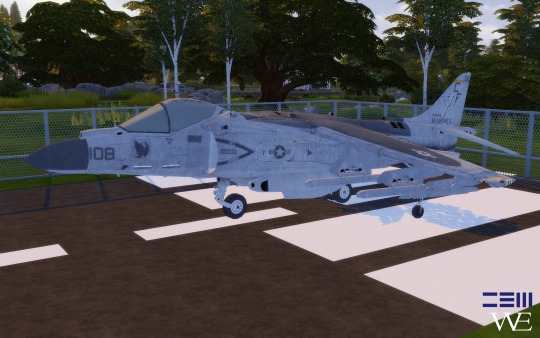
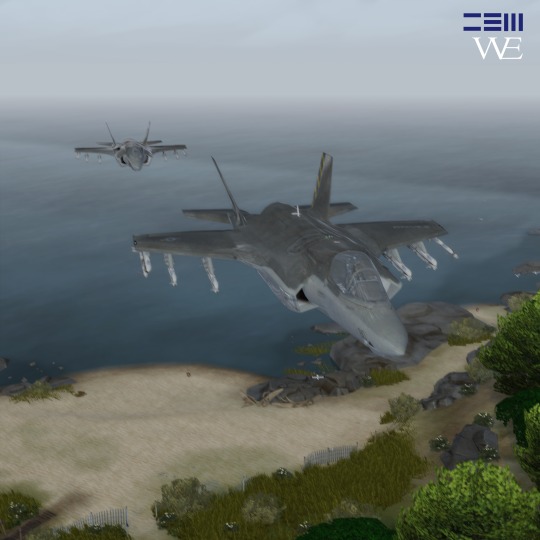
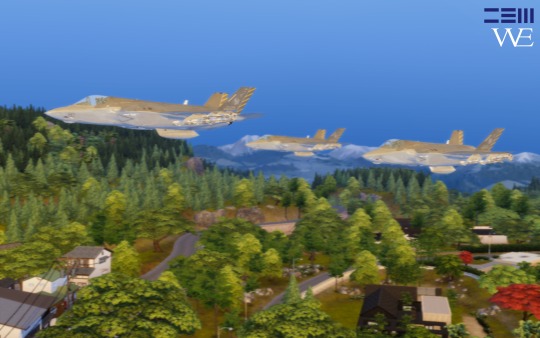

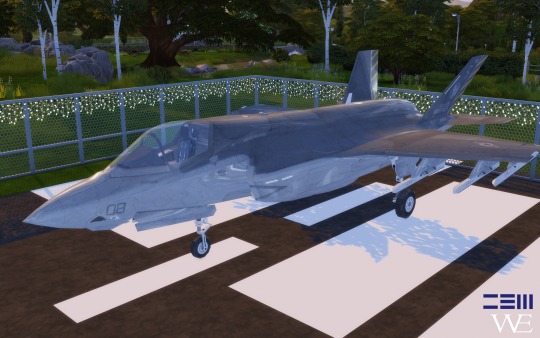
STOVL Fighters Collection
DOWNLOAD
At the end of 1950s, the engineers had just an idea of delivering the aircraft even without a runway. Then in the beginning of 1960s, some tests conducted to test the capability of STOVL (Short Take-Off Vertical Landing) or in other word, a possibility of vertical movement of the fixed-wing aircraft, began with the "Flying bunk" in1959. Then the Hawker Siddeley Limited in Britain proposed a concept named "P1127 Kestrel" as a prototype of the VTOL fighter. Then this concept acepted and in 1969, the production of Harrier GR1 had begun. This aircraft was intended to be in use for Royal Air Force, but the Royal Navy also got their own version of FRS1 years later. These Harriers sought it's first battle experience in Falklands War in 1982 when these Harriers brought down some of the Argentine's air capability without any losses. The last of the Harrier production was in GR9 variant which subsequently substituted by the latest F-35B by the Royal Air Force.
McDonnell-Douglas AV-8B Harrier II
The USMC was also seeking the aircraft that suits for the amphibious mission. After the success of the Harrier FRS1 and GR3 variants in the Falklands War, in 1985 the USMC proposed an inquiry to acquire some of these aircrafts, with also stated that these aircrafts should be manufactured in the United States. Then BAe Industries licensed the Harrier to the McDonnell-Douglas company . Also this aircraft met the service within the Royal Spanish Navy in 1987. Several missions has been done by AV-8Bs including Gulf War, Operation Enduring Freedom, Operation Iraqi Freedom and Libyan Crisis.
Lockheed Martin F-35B
The STOVL variant of F-35 Thunderbolt which it's STOVL technology derived from Yak-141 VTOL system, which sold to the Lockheed Martin in 1992, which emphasizes the vector exhaust and a fan in the middle of the aircraft. Also the most wanted aircraft in action of this century. The F-35B is the short take-off and vertical landing (STOVL) variant of the aircraft. Similar in size to the A variant, the B sacrifices about a third of the A variant's fuel volume to accommodate the SDLF. This variant is limited to 7 g. Unlike other variants, the F-35B has no landing hook. The "STOVL/HOOK" control instead engages conversion between normal and vertical flight.The F-35B is capable of Mach 1.6 (1,976 km/h) and can perform vertical and/or short take-off and landing (V/STOL)
#the sims 4#the sims#the sims 4 custom content#ts4 cc#ts4military#the sims 4 military#ts4#the sims 4 cc#ts4cc#deus ex machina#the sims 4 decades challenge#ts4 decades challenge#sims 4 decades#early 2000s#late 2000s#2000s style#fighter jet#f 35 lightning ii#british#american
27 notes
·
View notes
Text
Ace of Spades
Cards come up a lot in Dr. Stone, such as joker cards, trump cards, or even the whole deck, but the concept of aces, specifically from the spade suit, come up a lot more.

We'll start by considering aces as a whole...
...Or aces in the hole, as Ginro and Suika have been referred to in the past. chapters 107 and 108 have matching ace-related titles thanks to them hiding away on the Perseus. Together, the pair make the double aces that save the day!


For those not familiar with the term, an ace in the hole means "a hidden advantage or resource kept in reserve until needed", which suits the way the Kingdom of Science operates. They wait until the last moment to reveal their plan, to dramatic effect.
If it's not spoiled beforehand, that is.

On the topic of double aces, the poker game that occurs in chapter 144 results in 5 aces being shown at the end.
The doubled card? The ace of spades.


(If you were wondering who had the imposter card, it looks like Senku had it. The size of the middle spade is smaller than the other cards, comparatively.)



So who was the ace? Senku, for winning the game? Ryusui, for getting what he wanted with the casino? Both of them had the ace of spades card, which is generally considered the highest card in the whole deck, but everyone involved in that game is an ace in their own right.

The only one who didn't get what they wanted in that particular instance was Gen, who was frustrated by his loss.
So let's look at one of Gen's ace-related wins: the gambit against Moz on Treasure Island.

Gen's opening move was to distract Moz momentarily using the still-unstabilised drone. The drone here is an ace for two reasons: first, to draw Moz's eye away from Gen so he can sneak closer, and second to make the Kingdom of Science seem more powerful than they actually are.

Gen uses his weak card against Moz, who is the strongest card in the Treasure Island deck.
Gen may have bluffed his way forward, but ultimately Moz never stood a chance against Gen, the man whose entire skill set revolves around manipulating cards...


Being the highest and most valuable card in the deck, the ace of spades isn't immune to superstition. One of the main superstitions marks it as an omen of bad luck.
This seems to follow in Dr Stone too with those associated with the card: Moz's loss against Hyoga, Ryusui's 5 petrifications, Senku's constant bad luck, the fate of the drone, ace pilot Charlotte crashing, Tsukasa's deaths*...
(*I'll get to that last one in a moment)
The other superstition around the card is how the ace of spades became known as the "death card". Military units used to use it as their symbol as it was the highest in the deck, and during the Vietnam war scattering the cards was used as a fear tactic.
The origin of the suit is also military in nature: the design is based on the pike or halberd, two European polearms.
The name itself likely came from the word for sword, similar to Spanish's "espada".

So now we have the final question:
Who in Dr Stone encapsulates the ace of spades card best? Who is simultaneously the strongest, unlucky, surrounded by death and also has roots relating to warfare?
If you guessed Tsukasa, you're right!
He was introduced as the Strongest High School Primate by Taiju, has a sad backstory and is constantly being separated from Mirai, has died twice now and uses an enormous sword wider than a shovel (that sword is the real spade here).

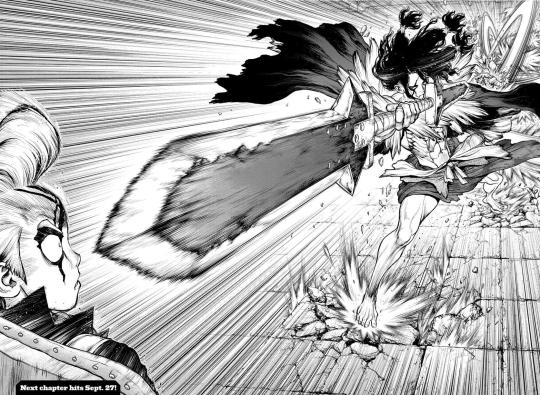
In case you still have doubts, even Stanley agrees! In chapter 189, Stanley's mind conjures up the ace of spades for Tsukasa, along with the ace of hearts for Kohaku and the ace of clubs for Hyoga.

Interestingly, cards with enemy faces printed on them were issued during the Iraq war (most-wanted Iraqi playing cards, if you're curious), so I wonder if this is why Stanley was thinking of them in terms of playing cards...

Also going back to the Vietnam war connection, both the battle in c.188 and the Vietnam war used guerrilla warfare tactics: launching attacks from hiding and using the terrain to your advantage.
In conclusion, the ace of spades repeatedly comes up in Dr Stone, but the only person it truly suits (haha) is none other than Tsukasa Shishio.

35 notes
·
View notes
Text
"How are we to interpret the reaction of the emissaries to their experience among the Arab Jews? Their reports show that their secularity was intertwined with a deep theological conception. Their agenda was dictated by a national program based on the sanctity of the Land of Israel and a passion for it; a primordial solidarity among Jewish communities and a perceived need to deliver them to Palestine. Their target audience, the Arab Jews, was expected to be purely religious Jews, and thus also potentially nationalist (i.e., proto-Zionist). Because of their own orientalism, however, the emissaries had a hard time identifying the Jewishness of the Arab Jews, which was not infused with national sentiments. Furthermore, the more secular the Arab Jews were in the emissaries’ perception, the more this blurred the distinction between them and the Arab space in which they existed, to the point of assimilation. The potent religious feelings that the emissaries hoped to find among the Arab Jews and to encourage among them were an extension of their own national-religious fervor, as well as an extension of their own view of Zionism as a Western, European project.
Hence the paradox presented at the outset. Emissaries who declared that they were secular (and even socialists), but who were imbued with a strong ethnic (national-religious) thrust, arrived on a mission to the Arab world via a hybrid network that was religious in origin (shadarut), found there communities that observed religious practices, yet reported back with disappointment about their lack of religion. Rather than accepting this reality, moreover, they aspired to infuse the Iraqi Jews with religious fervor.
In sum, the emissaries projected religiosity onto the Iraqi Jews, imputing religious feelings and sentiments to them in a way that reflected their own desire both to erase the difference between themselves and the Arab Jews at the national level and to recreate it. Their remarks show how their 'secularity' was intertwined with a deep political theology that was part and parcel of Zionist practice. Why couldn’t the emissaries accommodate the ostensible secularism among Arab Jews? Why did they project piety onto them? First, in order to erase their Arabness, as an act of de-Arabization. Here, religion is a signifier of their orientalist and colonialist perspective. Second, in order to define them as Zionists. Here, religion is a signifier of ethnicity. ... First, the emissaries used religion to define the Arab Jews as the 'other.' Religion became the ethnic marker of the Arab Jews. Second, they edited the Zionist ideological package and purified it — ostensibly — of its theological and ethnic roots. The outcome was the presentation of Zionism as secular and ethnically free. The Zionist 'secular' emissary could be secular, in fact, only if his interlocutor was religious. When he encountered the Arab Jews, who were ostensibly not Orthodox in their religious observances, the emissary began to fear for the status of the Jewish religion and nationalism."
Yehouda Shenhav, The Arab Jews: A Postcolonial Reading of Nationalism, Religion, and Ethnicity (2006)
13 notes
·
View notes
Note
You've said before that the Islamic Repubic of Iran is controversial within Shi'a Islam because there's not really supposed to be a Shi'a state, or something like that. Do you know what the stance is on historical Shi'a states like the Fatimi Caliphate in Egypt or the Savafid Empire in Iran?
It's important to understand that the Safavid Empire was a monarchy with Twelver Shi'ism as its official religion, while the Fatimid Empire was a Sevener/Ismaili Shi'a caliphate/imamate, so there are various rules to how an Islamic state can be imposed under these conditions.
For Twelvers, we don't have an Imam present at the moment; Twelvers believe he is in occultation (=Gheybah). This led to a debate regarding the establishment of an Islamic government whilst the Imam is in occultation. While the concept is not new, there has been various ideas, thus leading to strong debate within the scholarly institutions in Qum and Najaf. What S.Khomeini introduced was based on a theory, which holds that through a jurist, they can maintain religious, political and social order. This proved to be hignly controversial idea, because many grand Shi'i scholars were opposed to the establishment of an Islamic state, because of the lack of an Infallible Imam, leading to friction within the Twelver community. Indeed, the best example of anti-Iranian sentiment among Shi'a Muslims can be found in Iraq, which has long attempted to push away the growing Iranian influence in their religious and political affairs especially during the post-iraqi war era. In fact, even the greatest of scholars, Ayatollah Sayed Ali al-Sistani (r.a) remains neutral regarding the establishment of an Islamic republic/state and is a supporter of free democratic elections. The Safavid Empire was still a monarchy and couldn't be called an Islamic state in the same sense as the Ottoman Empire was a monarchy, since a real Islamic state can only be imposed by a divinely ordained Imam. I will not get into the Zaidiyya Shi'as (Fivers) as their theology differ significantly from Twelvers and Seveners.
The Ismailiyyas (or later the Tayyibi Ismailiyyas) differed from the Twelvers in the sense that they had a living Imam and was able to overthrow the Abassids in the Maghrebi region, thus being able to establish an Imamate under a divinely ordained system. However, this Imamate was shortlived as intra-religious feuds occured regarding the successorship of various caliphs, causing the Fatimid to weaken. The Ayyubid general Salah ad-deen took this as an opportunity and overthrew the Ismailiyya Fatimids. There are two remaining sub-branches of Ismaili Shi'ism, the Musta'alis and the Nizaris. While the Musta'alis do not have an Imam at present (the Da'is being their representatives instead), the Nizaris have a living Imam.
42 notes
·
View notes
Note
since miisagi has been a bit of a topic here lately, i'm curious about your perspective on a narrative they've been posting about lately. they've recently been reblogging/posting posts calling it ignorant for people to say israeli people should just move out of the country, because most people who participate in colonialism are disenfranchised by their original countries (used america and australia as examples) and we need to have some amount of sympathy for that. what are your thoughts on this concept? it seemed like bullshit to me at a first glance, but i figured since i'm a white descendant i should probably ask like an Actual native person for their thoughts
I'm gunna start of answering this by showing a screenshot from web-archive of vaer blog & a "before you follow list" on that blog in 2018 (& this is AFTER vae started calling vaemselves "Ojibwe"). Look at the second last bulletpoint under the "Do not follow if you are a ____" heading.

Lol. Vae have been posting some "both sides" bullshit according to my beloved Palestinian mootie, so I think it's pretty safe to say that this person is a zionist. Normally, I'd say that 2017 is quite a while ago and is a long enough time for a person to have changed, but if this person is STILL using some z*onist talking points, again I'm inclined to believe vaer position is relatively unchanged.
Now, I'm not Palestinian so I'm not going to try to tell Palestinians how to decolonize or how they should feel about settlers on THEIR land. Unlike some other people. But I think it bears reminding that this is literally what Isntreal's zionism uses as a justification for its colonial existence, and as a justification for Palestinian genocide. Isr*el has also done things such as carrying out bombings against the Iraqi Jewish population in order to encourage them to move to Isr*el in 1950-1, which worked, so it becomes this loop of "its dangerous for you there, come move here!". (And I don't mean to say that certain groups, or in this case that I provided, Jewish people, are not discriminated against to the point of fearing for their own safety as it is already, that much is true: but rather its that this colonial State will weaponize that fact and then help commit atrocities against the population it claims to want to protect in order to reinforce genocide & colonization.)
People often use the "imagine if someone went into your house and said 'this is mine now' and just kicked you out" to try help people understand how fucked up the colonization of Turtle Island was & how stupid it is that people still celebrate people like Columbus. In a lot of cases, that analogy is quite literally what is happening in Palestine. Palestinians are quite literally being kicked out of their actual houses to make way for settlers.
So vaer literally just parroting colonial talking points, and given the screenshot above I am not inclined to give vaem the benefit of doubt. If anything this kind of shows me vae have DEFINITELY spent a good chunk of vaer life as a White person because the irony of defending the existence and settlement of one colonial, genocidal state (Isntreal) but not another (the "Americas"), despite the fact that the EXACT same tactics for genocide & colonization have been used in both, while claiming to be "Indigenous" to the latter and talking about Indigenous rights & issues that vae may not even have had to live through is just. Too much. The richness of calling OTHER people "ignorant" is red velvet rich.
14 notes
·
View notes
Note
We are holding hands speaking languages with gendered plural pronouns as a nonbinary im so frustrated feeling that my language doesn’t acknowledge i exist and lacks the concepts to describe who i am. Ive always been curious about learning arabic, and im so curious about palestinian-specific linguistics
omg yeah it's hard to be gender neutral when your language only has gendered pronouns, especially when even the plural pronouns are gendered 😭 we just gotta cope and find whatever works best for us. i feel like language can definitely expand and adapt though, so maybe in the future more gender neutral inclusive language will be developed in already existing languages, like arabic. who knows 🤷♂️
it's cool you're learning arabic. it's hard but it is interesting to learn, with all the different dialects and versions and stuff. i wouldn't say palestinian arabic is more special than any other, but i do think it's versatile and easier to learn than say like,, iraqi arabic, yk? (or maybe i'm just biased lol) and you can learn different types of arabic through it as well. i hope your arabic journey goes well :)
15 notes
·
View notes
Text
Ridley Scott is a director that I largely view as washed up right up until he releases another good movie, at which point I wait around for his next run of bad films before I resume my judgement and hold it until he makes another good film, restarting the cycle. And he always seems to do this, following every Exodus: Gods and Kings or Robin Hood with The Martian or Prometheus and resetting my respect for him.
I don't think that "Ridley Scott is sort of washed up" is a controversial statement. At least not at the moment, considering popular reactions to Napoleon. Maybe Gladiator 2 will be good and he'll prove us all wrong. What's more interesting is Scott's tendency to make movies in his run of good films that are undoubtedly solid, but don't reach the acclaim of Blade Runner or Blackhawk Down. Films like All the Money in the World, The Last Duel (or House of Gucci for that matter) are solid but frankly understated for being Ridley Scott pictures, and only really shine when compared to his bad films or the idea of his bad films (re: Gladiator 2). They're certainly not Alien or Thelma and Louise, but Scott clearly uses them to explore interesting concepts and develop his craft in new ways. Body of Lies is one of those films.
The movie itself is by no means revolutionary. A 2008 film made about the war on terror, the biggest thing the plot does is explore the internal agency politics and infighting of the era's spycraft organizations rather realistically. Other than the inclusion of surveillance drones, the movie is a bone stock antiterror spy thriller from the same era, albeit with a fantastic selection of Iraqi cars on display.
Where Scott really works on this film is the interplay between Leo DiCaprio (a young operative with his boots on the ground) and Russell Crowe, his Cold-War-forged handler who calls the shots from Washington DC. Using their relationship to echo the disconnect between Washington and boots on the ground in Iraq, Scott positions spies as much more fallible than the Bush era propaganda machine would have us believe. Most interesting to me is how Crowe's character was handled. While DiCaprio chases informants down dark alleyways and dodges gunfire on dusty desert roads, we almost exclusively see Crowe's spy chief calling the shots from the phone while picking his daughters up from football practice or fixing breakfast for the kids or puttering about in his home office waiting for breakfast to be ready.
The war on terror is a lazy man's war at this point. It's all drone strikes and Crowe's presence halfway around the world overriding DiCaprio's decisions is an elegant way of portraying this, even if the rest of the film is largely boring otherwise.
5 notes
·
View notes
Note
"looking iraqi" as a concept is very strange to me because like you said we're very diverse, like even within my own family there are people who are really light skinned and really dark skinned. for me some people guess I'm iraqi immediately upon meeting me but I get a lot of other assumptions like Spanish and Pakistani (most brown hijabis you see in the uk are pakistani but it reads to me a lot of the time i think all brown people are the same). I think the lebanese thing specifically is brought on a lot by colourism, lebanese people are perceived as predominantly light skinned which equates to beauty and iraqis are perceived as being predominantly tanner which isn't deemed as beautiful. which is dumb because there's lebanese people and iraqis of all skin shades and none are less beautiful than the next. it sucks I've heard people in my family refuse to take their baby out in the sun because what if she gets darker
This is so well articulated!!! Agreed w everything you say!
#I remember meeting Iraqi relatives I hadn’t seen since I was a child#And one of them looked at me and straight up went “wow you’re so beetha (white)… so beautiful” and I WAS LIKE 🥲🥲🥲#Ick ick massive ick#It’s not just Iraqis btw like I remember being at the dentist’s once and I happened to sit next to two Arab ladies#And they both turned to me and reverently were like ‘you look Lebanese… so beautiful’#And ik Lebanese people have beautiful features so it partially comes from that#But it definitely also had to do w skin tone
21 notes
·
View notes
Text

Again asking for people to put Nur Masalha's Expulsion of the Palestinians: The Concept of "Transfer" in Zionist Political Thought, 1882–1948 (1992) in their reading list.
The amount of research that went into showing several trends of the plans that were drafted and dropped and revised in regards of planning what us Palestinians call the Nakba is so well done on Masalhas part because he captures how preoccupied zionists were with the palestinian question or in other words the pressing question of how to transfer the palestinian population. Their diaries, their recorded speeches in public, to the published articles, and memos to the UK and US government reveal how scientific they were about Palestinians. They thought of palestinians as movable as inanimate objects, essentially chattel. The argument between zionists wasn't whether the transfer was immoral or not but whether it should be done voluntarily or compulsory. Voluntary transfer was as ridiculous as it sounds but they were very detailed about how they would go about it. One plan was to give land to Palestinians in Jordan and the other to purchase land in Iraq:
“The Weizmann-Rutenberg scheme of 1930, which was presented to the Colonial Office, proposed that a loan of one million Palestinian pounds be raised from Jewish financial sources for the resettlement of Palestinian peasant communities in Transjordan, pending the granting of permission for Zionist settlement east of the Jordan River.”
. . .
“While Weizmann’s 1930 transfer proposals were rejected by the British government, the justifications used in their defense formed the cornerstone of subsequent argumentation for transfer. Yishuv leaders continued to assert that there was nothing “immoral” about the concept; that “the transfer of the Greek and Turkish populations provided a precedent for a similar measure for the Palestinian Arabs; and that the uprooting and transfer of the population to Transjordan, Iraq, or any other part of the Arab world would merely constitute a relocation from one Arab district to another.”
The Iraq "transfer" plan
Edward A. Norman (1900–1955) was a New York-based Jewish millionaire who devoted much of his fortune and his political activity to supporting the Yishuv. In 1939, he established the American Fund for Palestine Institutions (later to become the American-Israel Cultural Fund), as “the first agency for joint and unified fund-raising on behalf of the cultural institutions” of the Yishuv and later Israel.
. . .
In 1934, he worked out a detailed plan for the evacuation of Palestinian Arabs to Iraq which went through several versions before it was noticed as of late 1937. By early 1939, Norman’s plan had come to the attention of Weizmann, Ben-Gurion, and Shertok, who were in London during February and March for the St. James Conference. Weizmann, especially, made serious efforts to promote it.
The initial plan, a 19-page typewritten memorandum in English dated February 1934, was entitled “An Approach to the Arab Question in Palestine.” Its premise was that “immigration and possession of the land by definition are the basis of the reconstruction of the Jewish homeland.” At the same time, Norman acknowledged that Jewish colonization was a “genuine cause of concern” for the politicized Palestinian Arabs, since it entailed “taking over Palestine without the consent of the indigenous population.” Thus, the task facing the Yishuv was to ensure that “the Jews gradually are to fill up Palestine” while at the same time finding the Arab population a place to go, for “[the Arab population] cannot be exterminated, nor will it die out.”
He considered the “kingdom of Iraq” as a preferable destination “particularly [for] Arabs with agricultural experience,” and wanted the Iraqi government “to donate land and permit the importation of Arab farmers with their goods and chattels free of duty and visa fees.” Also “free transportation of persons, movable property, and livestock would have to be offered as well.” The collaboration of Arab political leaders and the Arab press would have to be obtained for this operation. Echoing earlier Zionist theories about the Palestinian character, he went on:
It must be remembered that a transportation such as suggested by Arabs from Palestine to Iraq would not be a removal to a foreign country. To the usual Arab there is no difference between Palestine, Iraq, or any other part of the Arab world. The boundaries that have been instituted since the War are scarcely known to many of the Arabs. The language, customs, and religion are the same.
. . .
The cost of settling a Palestinian family of six persons in Iraq was estimated at $300. Norman hoped that the indigenous population could be “bought out” and induced by economic rather than other means to evacuate Palestine.
#i knew the weizmann plan already#but i never really read these things in detail#its amazing how much they wrote#i dont mean to place palestine in a unique spotlight bc israeli tactics are the tactics of any settler nation but historians have pointed#out that the deliberate incessant planning was much more pronounced its so easy to look at their rhetoric and draw a straight line#of how they got from the first zionist council to the nakba#in 50 years#palestine
11 notes
·
View notes